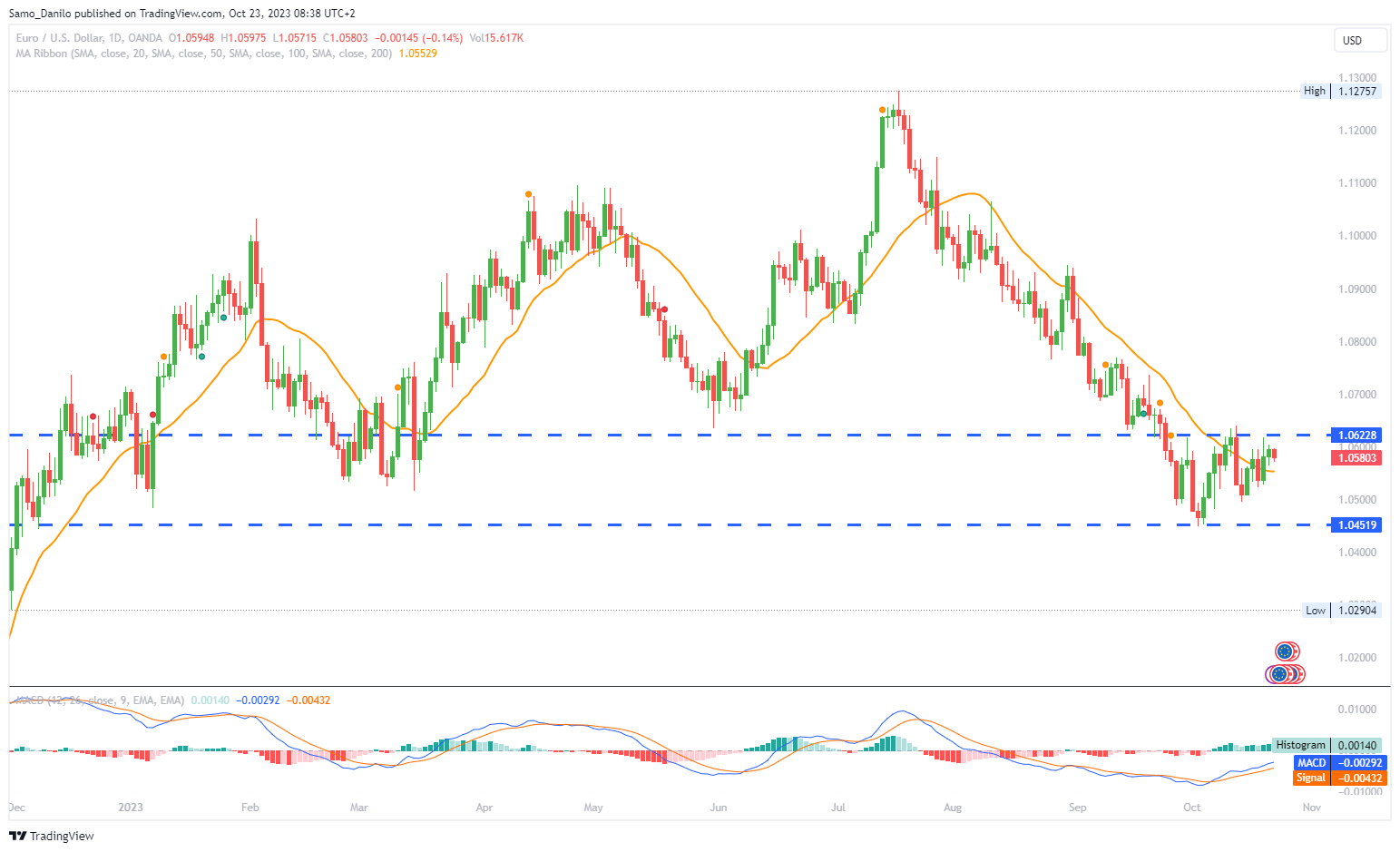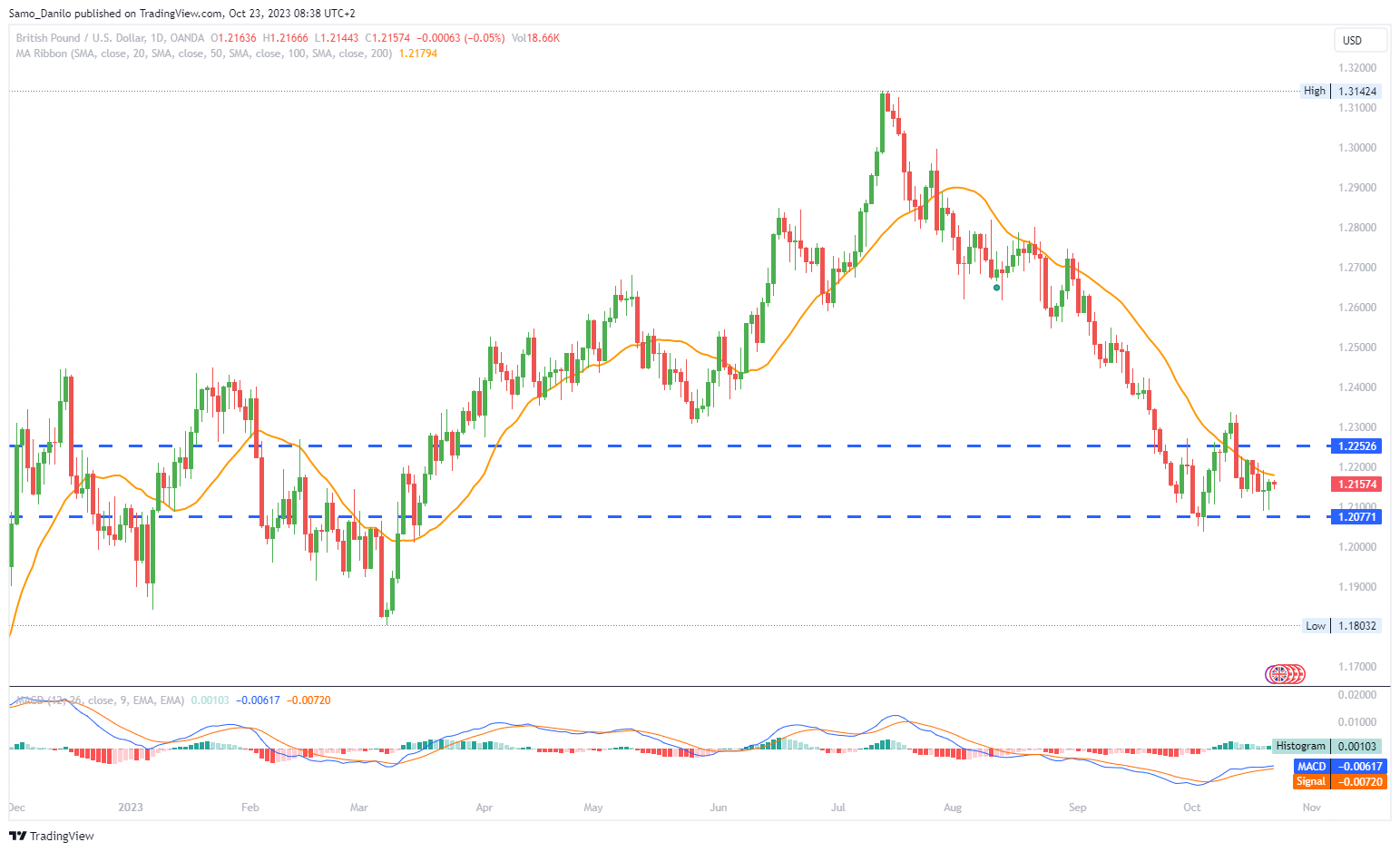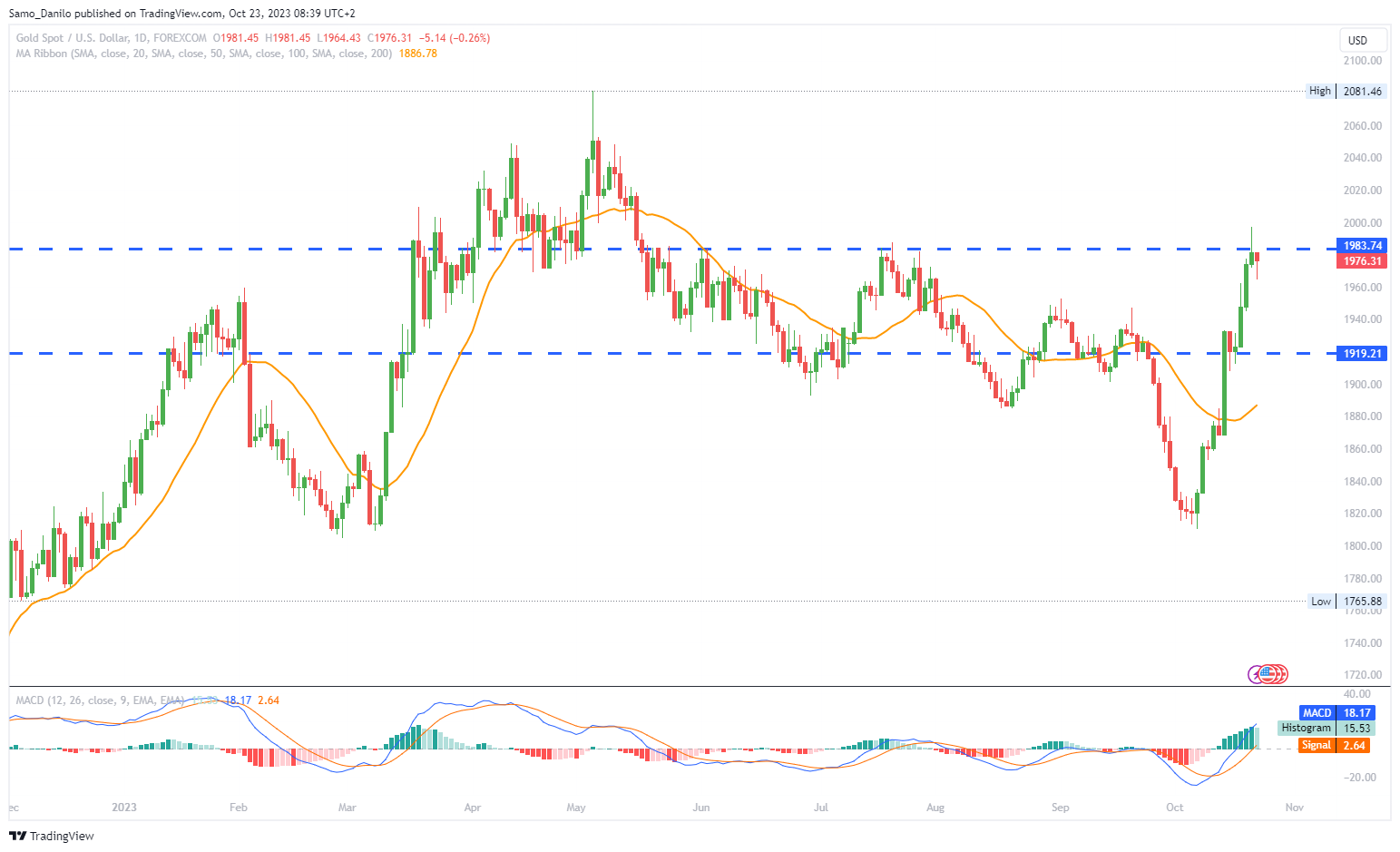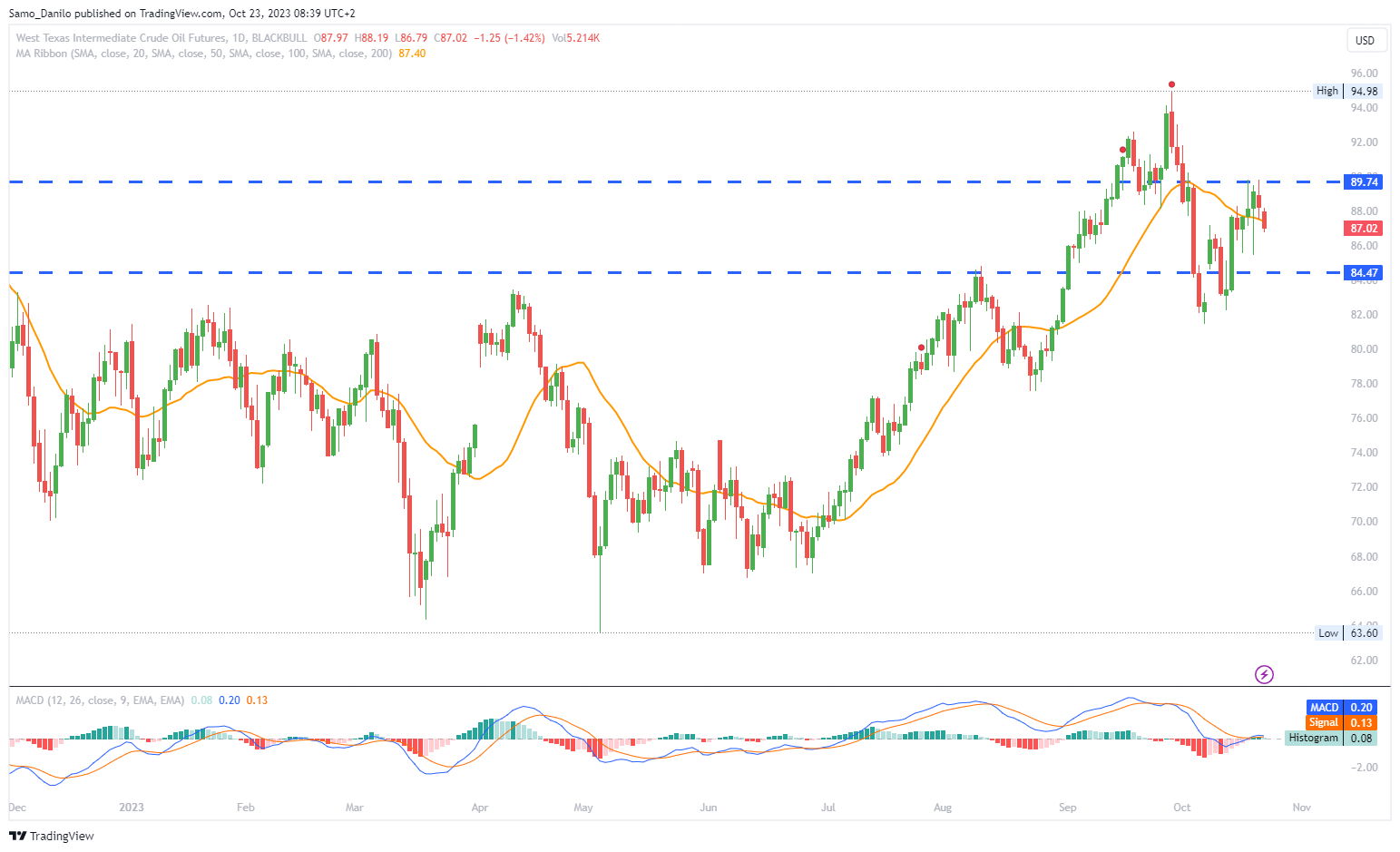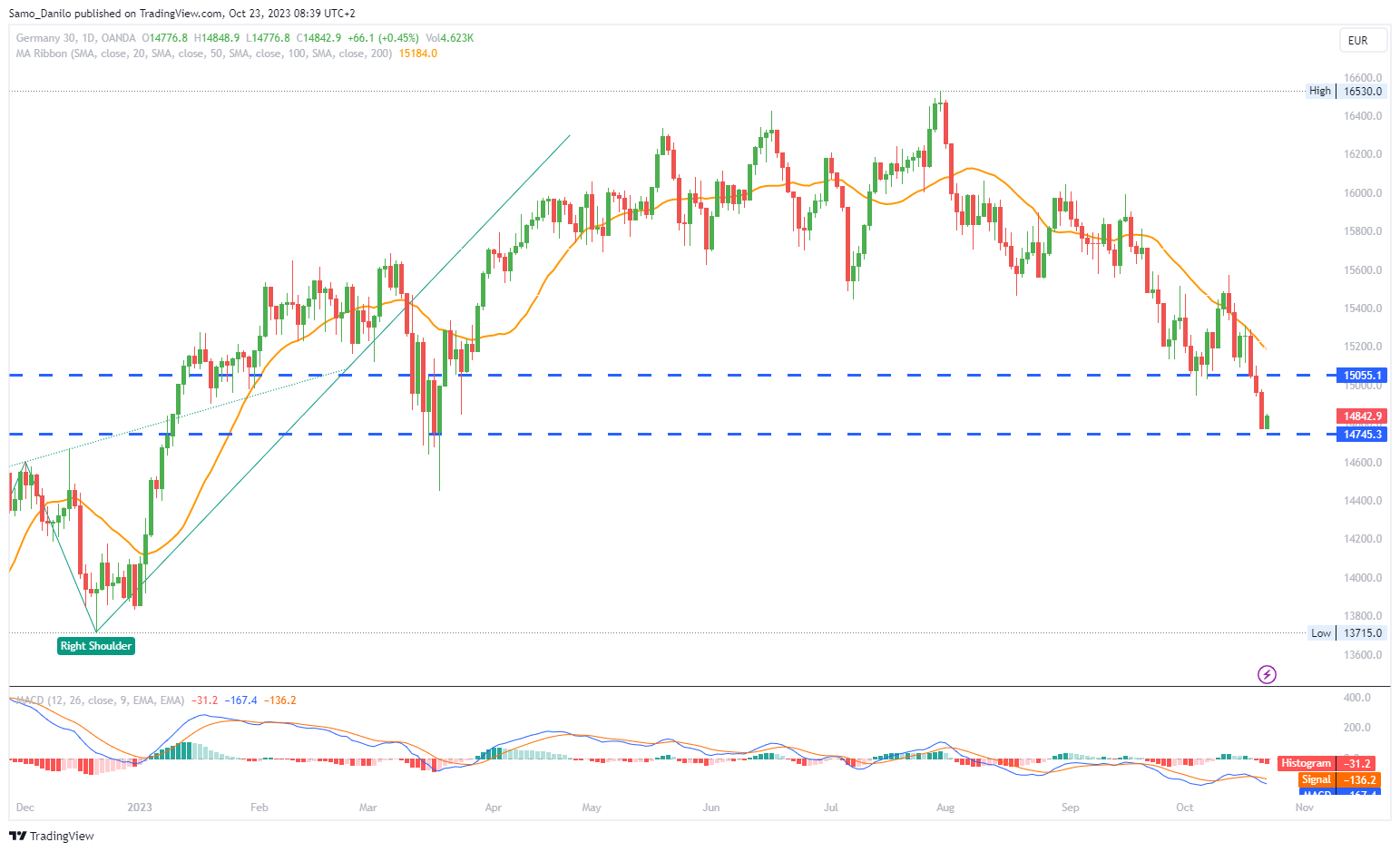EURUSD
- The EUR/USD pair snapped a two-day winning streak during the early European session on Monday, indicating a period of retracement or consolidation.
- In terms of technical analysis, the 1.0600-1.0610 region is acting as a key resistance level for this major pair. The Relative Strength Index (RSI) is located in the 40-60 zone, suggesting a non-directional movement in the pair.
- Market participants are eagerly awaiting the European Central Bank (ECB) Interest Rate Decision scheduled for Thursday. No rate change is expected, and it's widely believed that the ECB's rate hiking cycle is over. However, it's anticipated that easing measures may not begin until at least July 2024 as the battle against elevated inflation continues.
- Additionally, the European Union is contemplating extending an emergency gas price cap imposed in February. This consideration comes amid concerns related to the Middle East crisis and the sabotage of a Baltic pipeline, which could potentially drive gas prices higher during the upcoming winter.
- The fear of a Eurozone energy crisis has the potential to exert selling pressure on the Euro and act as a headwind for the EUR/USD pair.
Closing statement:In summary, the EUR/USD pair is experiencing a break in its recent upward momentum, with technical indicators suggesting a non-directional movement. Market focus is on the upcoming ECB Interest Rate Decision, with the expectation that rate hikes are paused, at least until mid-2024, due to persistent inflation concerns. Additionally, the Euro's performance may be influenced by the possible extension of a gas price cap in the EU amid fears of an energy crisis in the region.
GBPUSD
- The GBP/USD pair is struggling to maintain its winning streak, trading around 1.2160 during the Asian session on Monday, indicating a possible pause in the recent positive trend.
- Bank of England Governor (BoE) Andrew Bailey has mentioned that he anticipates a "marked fall" in inflation in the coming month. When analyzing September's inflation data, he noted that "core inflation fell slightly from what we expected, which is quite encouraging." This commentary from Bailey has made it challenging for GBP/USD to gather recovery momentum.
- On the global front, Fed Chair Jerome Powell has signaled a desire to pause rate hikes and closely monitor how economic data unfolds in the coming months, which is impacting the USD's strength and thus the GBP/USD pair.
- Atlanta Federal Reserve (Fed) President Raphael Bostic has expressed the view that he doesn't believe the US central bank will cut rates before the middle of next year. This perspective offers some insight into the Fed's monetary policy direction.
- In the coming days, important US economic data is scheduled, including the US S&P Global PMI on Tuesday, the first reading of Q3 Gross Domestic Product (GDP) growth on Thursday, and the Core Personal Consumption Expenditures (PCE) on Friday. These figures have the potential to provide a clear direction for the GBP/USD pair.
| SMA (20) | Falling |
|
|
| RSI (14) | Neutral | ||
| MACD (12, 26, 9) | Slightly Rising |
|
Closing statement: the GBP/USD pair is facing some hesitation in its winning streak, partly due to comments by the BoE Governor regarding an expected fall in inflation. The Fed's indication of a rate pause and the perspective of Fed officials like Raphael Bostic also influence this currency pair. Traders will closely watch upcoming US economic data for further guidance on the pair's direction.
GOLD
- Gold is currently experiencing a pause in its winning streak that commenced on October 17. It is trading lower at around $1,975 per troy ounce, having come close to breaching the $2000 level on Friday.
- Geopolitical tensions between Israel and Hamas have contributed to increased demand for gold, as it is traditionally considered a safe-haven asset. However, the current risk-on sentiment in the market is posing a challenge to the price of gold.
- As the Federal Open Market Committee (FOMC) enters its blackout period, Federal Reserve (Fed) Chair Jerome Powell and several other Fed officials have signaled that interest rates are likely to remain steady at the November meeting.
- Powell also mentioned that further monetary policy tightening might be deemed appropriate if there are more indications of above-trend growth or if the labor market stops easing.
- Fed Philadelphia President Patrick Harker reiterated his preference to keep interest rates unchanged. Additionally, Fed Cleveland President Loretta Mester stated that the US central bank is "at or near the peak of the rate hike cycle."
| SMA (20) | Slightly Rising |
| |
| RSI (14) | Slightly Rising |
| |
| MACD (12, 26, 9) | Rising |
|
|
Closing statement:In summary, gold is currently experiencing a pause in its winning streak, influenced by both geopolitical tensions and the overall market sentiment. The Federal Reserve, led by Chair Jerome Powell, has indicated a leaning towards maintaining interest rates at their current levels, although some officials have different perspectives on the rate hike cycle.
CRUDE OIL
- Western Texas Intermediate (WTI) oil prices are extending their losses for the second consecutive session. They are currently trading lower around $87.15 per barrel during the Asian session on Monday.
- Investors are growing increasingly concerned about the potential spillover of geopolitical tensions in the Gaza Strip. This situation poses a significant threat to the stability of the region near the Strait of Hormuz. This waterway is a critical chokepoint for global oil supply, with roughly one-fifth of the world's oil passing through its waters.
- Many on Wall Street believe that crude prices should be higher due to the relative proximity of the Gaza conflict to some of the world's largest oil producers, including Saudi Arabia, the United Arab Emirates, Iraq, and Kuwait.
- Data from the National Bureau of Statistics (NBS) reveals that China's crude oil output saw a 1.9% year-on-year increase in the first three quarters of 2023, reaching 156.72 million tonnes.
- Additionally, China's crude oil imports surged, with the country importing 424.27 million tonnes in the first nine months of 2023, reflecting a significant increase of 14.6% compared to the same period in 2022.
| SMA (20) | Falling |
|
|
| RSI (14) | Slightly Falling |
| |
| MACD (12, 26, 9) | Slightly Rising |
|
Closing statement:In summary, crude oil prices are declining as concerns about geopolitical tensions in the Gaza Strip and their potential impact on the oil supply via the Strait of Hormuz weigh on the market. Additionally, China's crude oil production and imports are notable factors influencing the market.
DAX
- The DAX index experienced a significant decline on Friday, falling by 1.64%. This followed a 0.33% loss on Thursday, leading to a weekly loss of 2.56%, with the DAX closing at 14,799.
- German producer prices contributed to concerns about a possible recession. In September, producer prices declined by 0.2%, in contrast to forecasts of a 0.4% increase. In August, producer prices had risen by 0.3%, making the September decline particularly concerning.
- Market concerns about an escalation in the Middle East conflict further contributed to the negative mood in the market. Reports that US President Joe Biden sought funding to aid conflicts in Israel and Ukraine likely spooked investors.
- In the upcoming session, Eurozone consumer confidence figures will be closely watched by investors. If confidence falls more than expected, it could have a significant impact on overall market risk sentiment.
- As the week begins, the DAX retains a downside bias. The looming threat of a regional Middle East conflict is expected to continue impacting investor appetite for riskier assets.
| SMA (20) | Falling |
|
|
| RSI (14) | Falling |
|
|
| MACD (12, 26, 9) | Slightly Falling |
|
Closing statement: the DAX faced a sharp decline on Friday, driven by concerns about recessionary signs in Germany, heightened geopolitical tensions in the Middle East, and the potential impact of US funding for conflicts in Israel and Ukraine. These factors continue to influence market sentiment as the new week begins.
